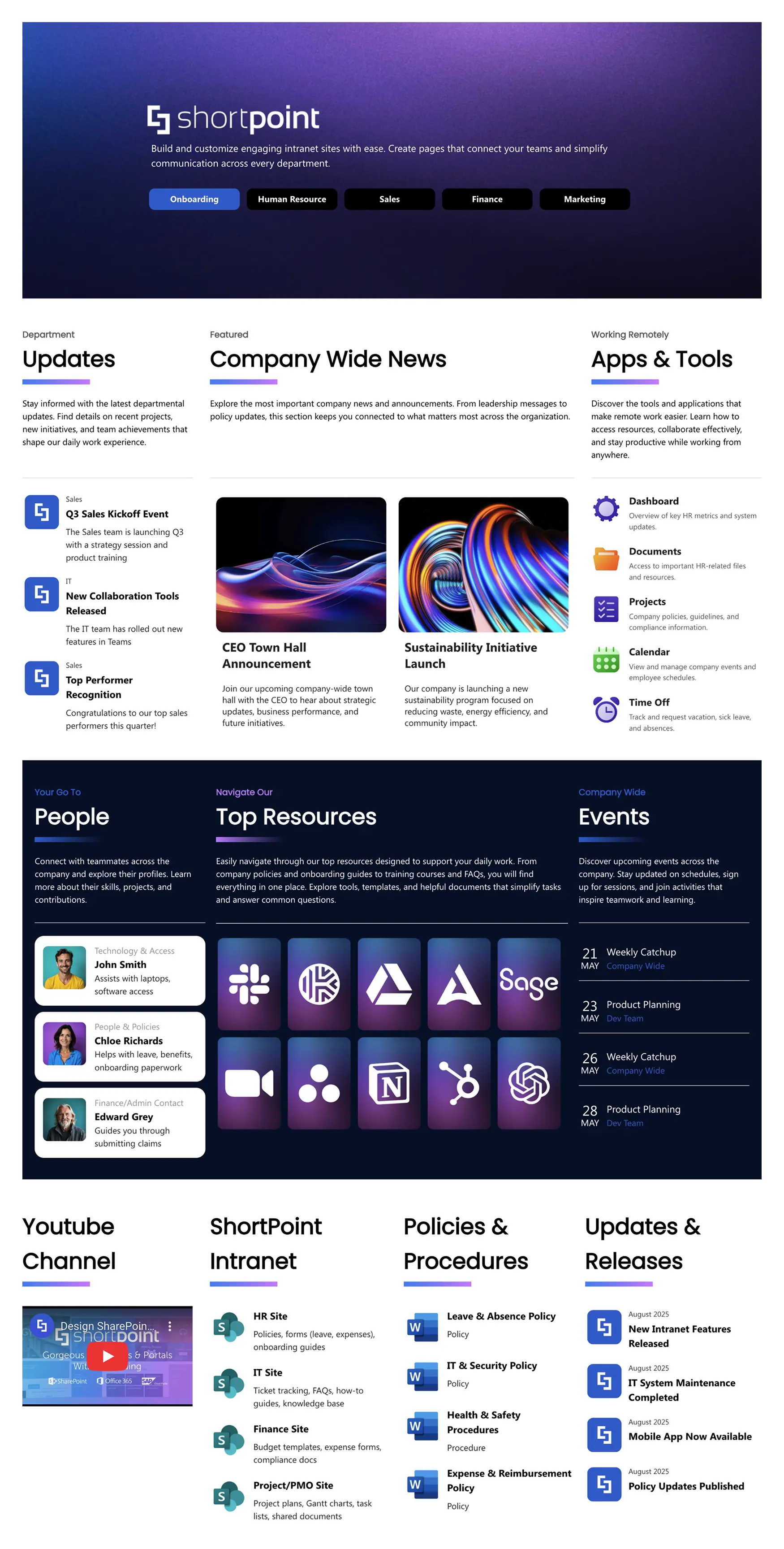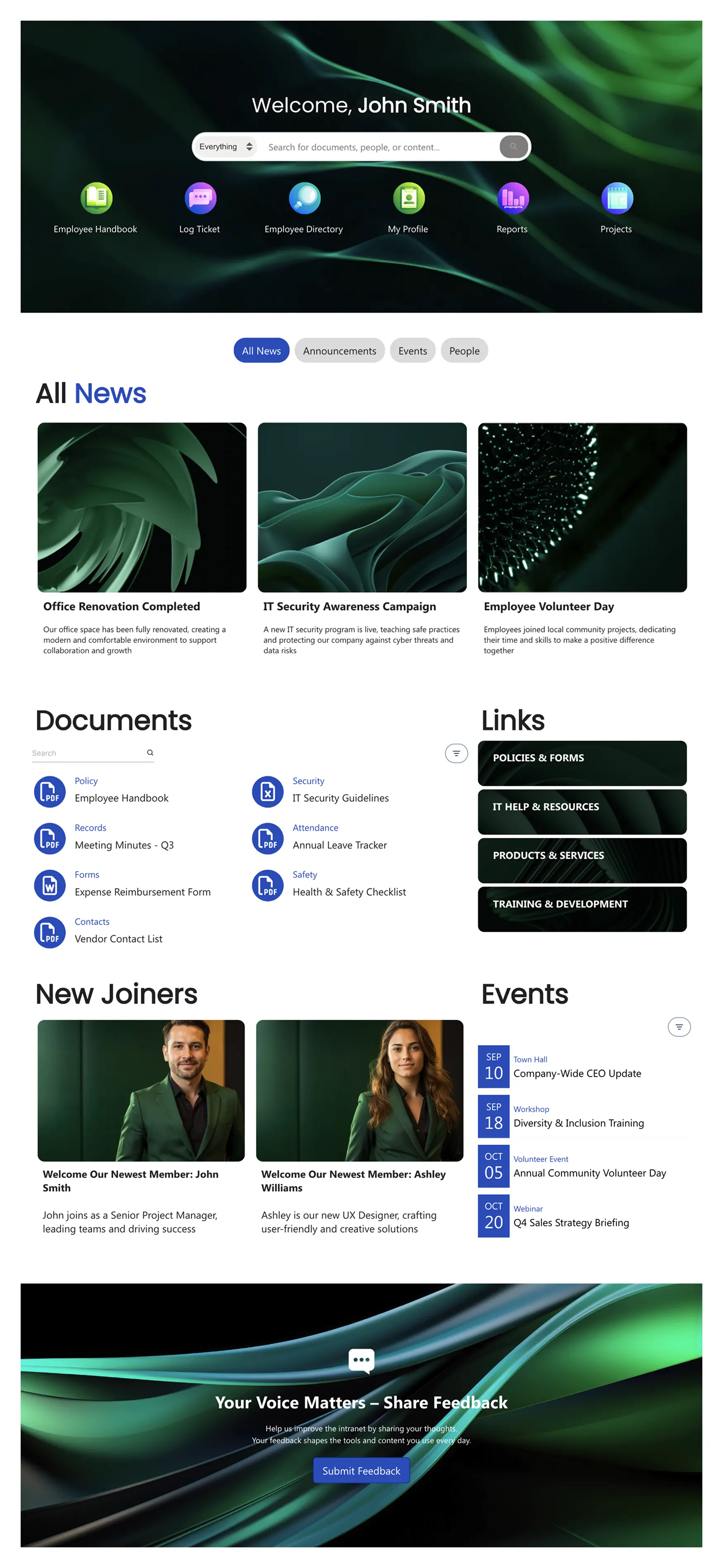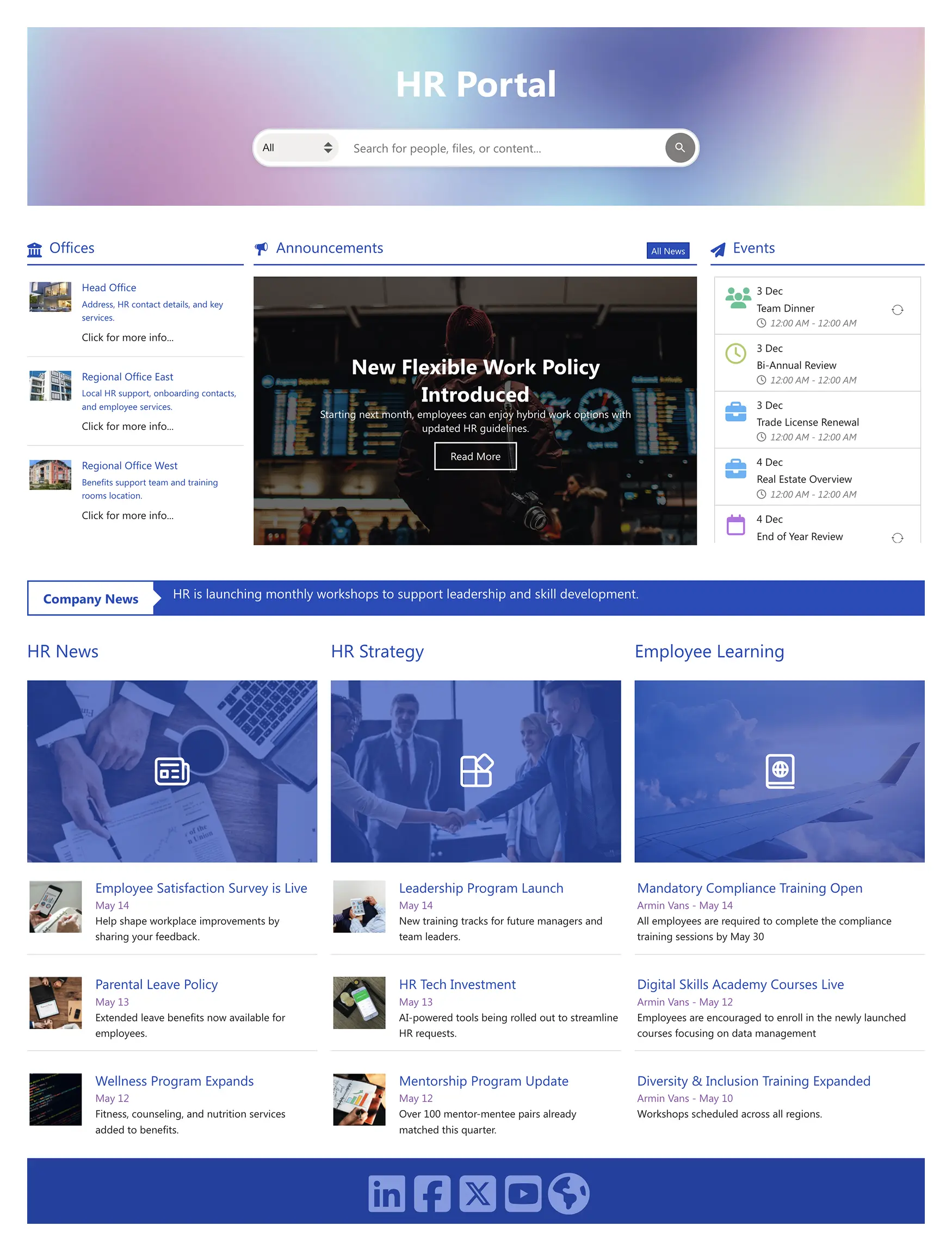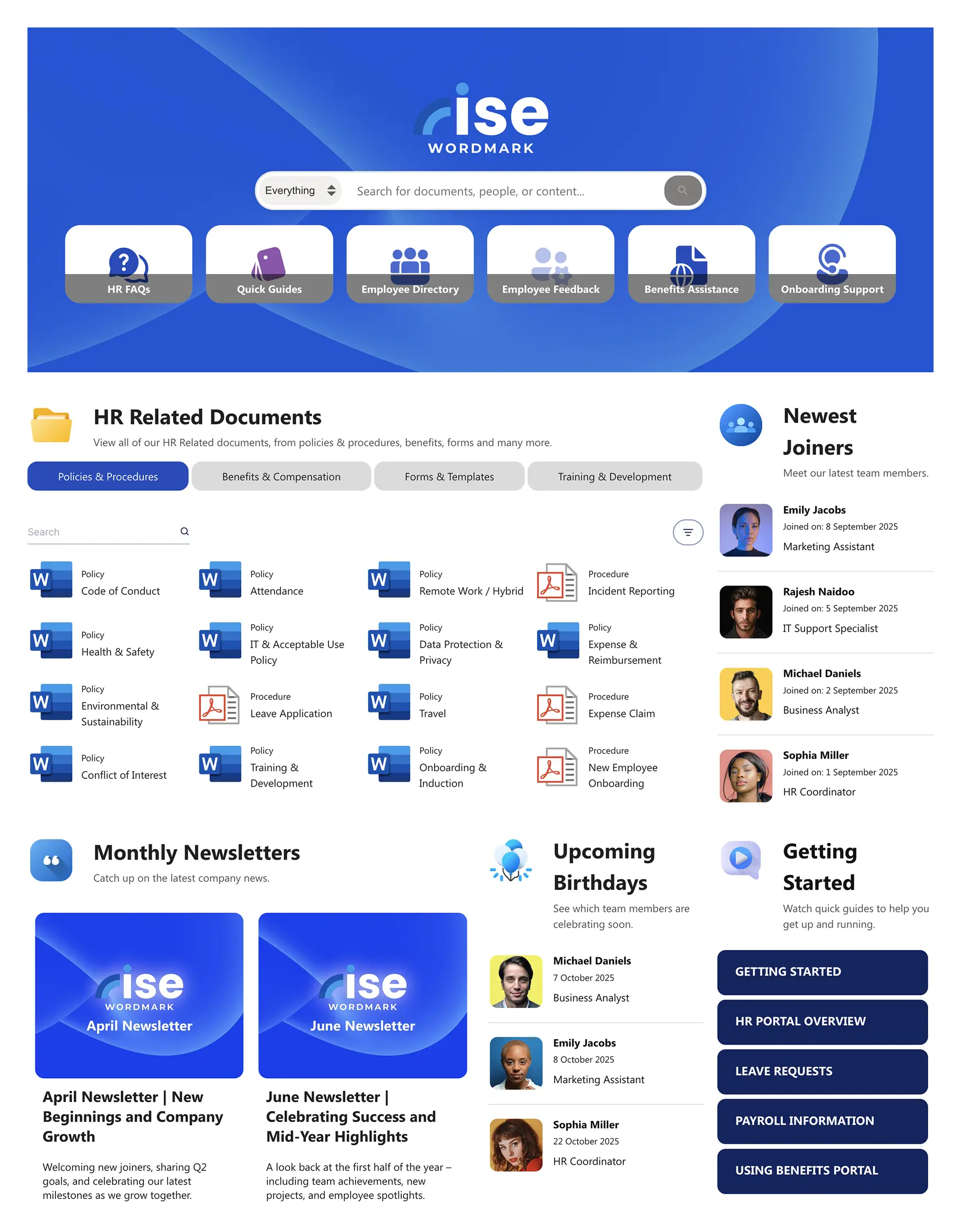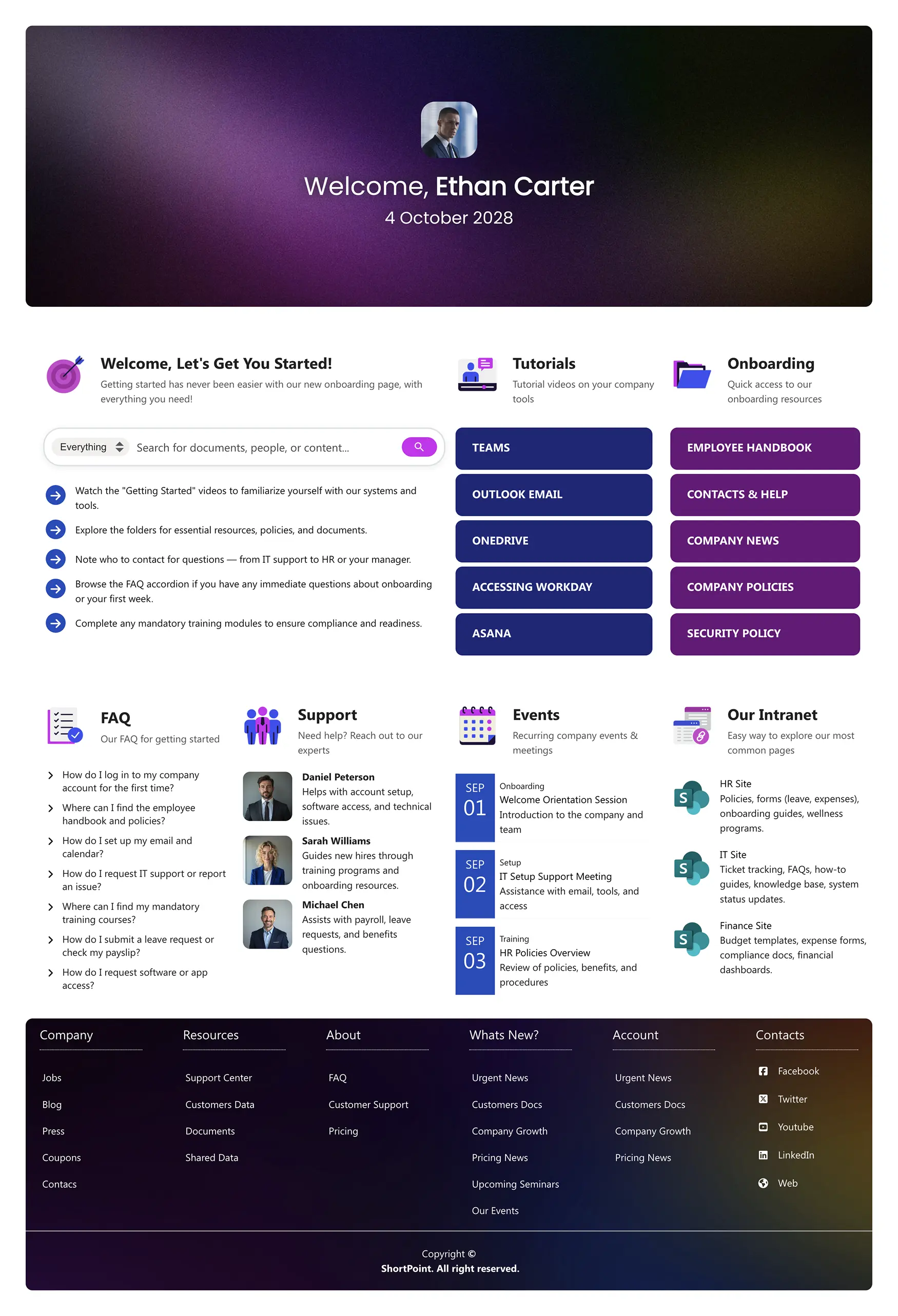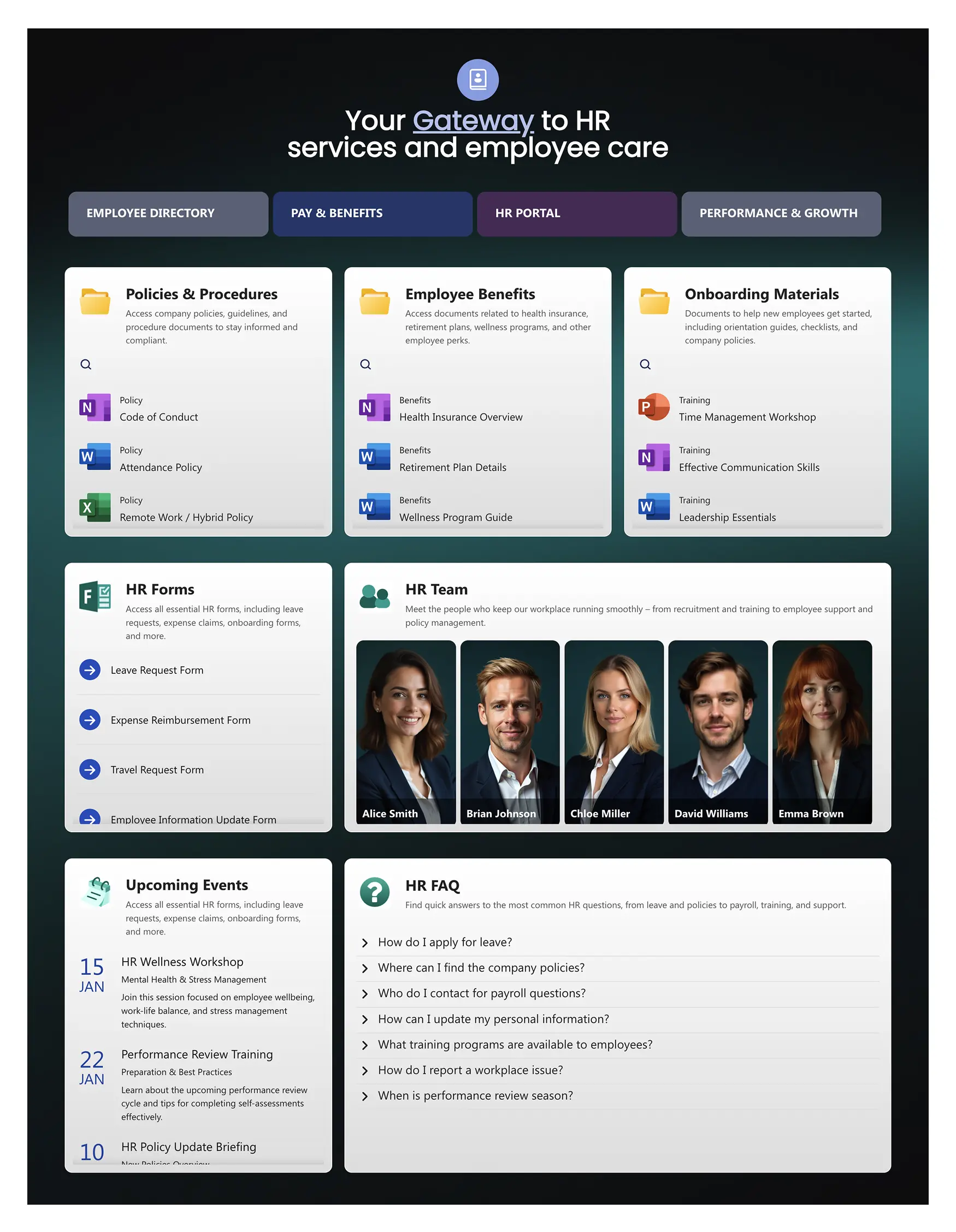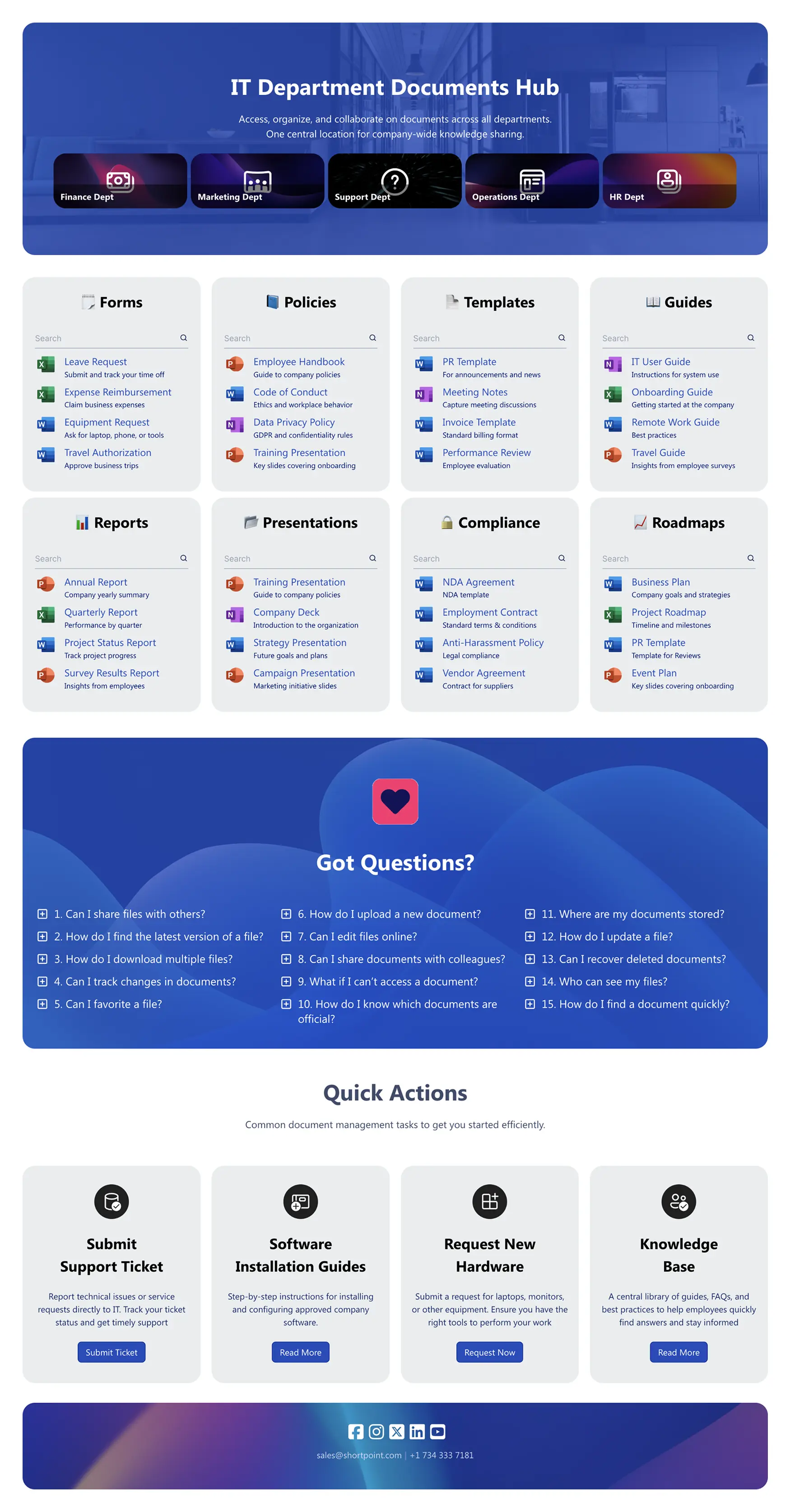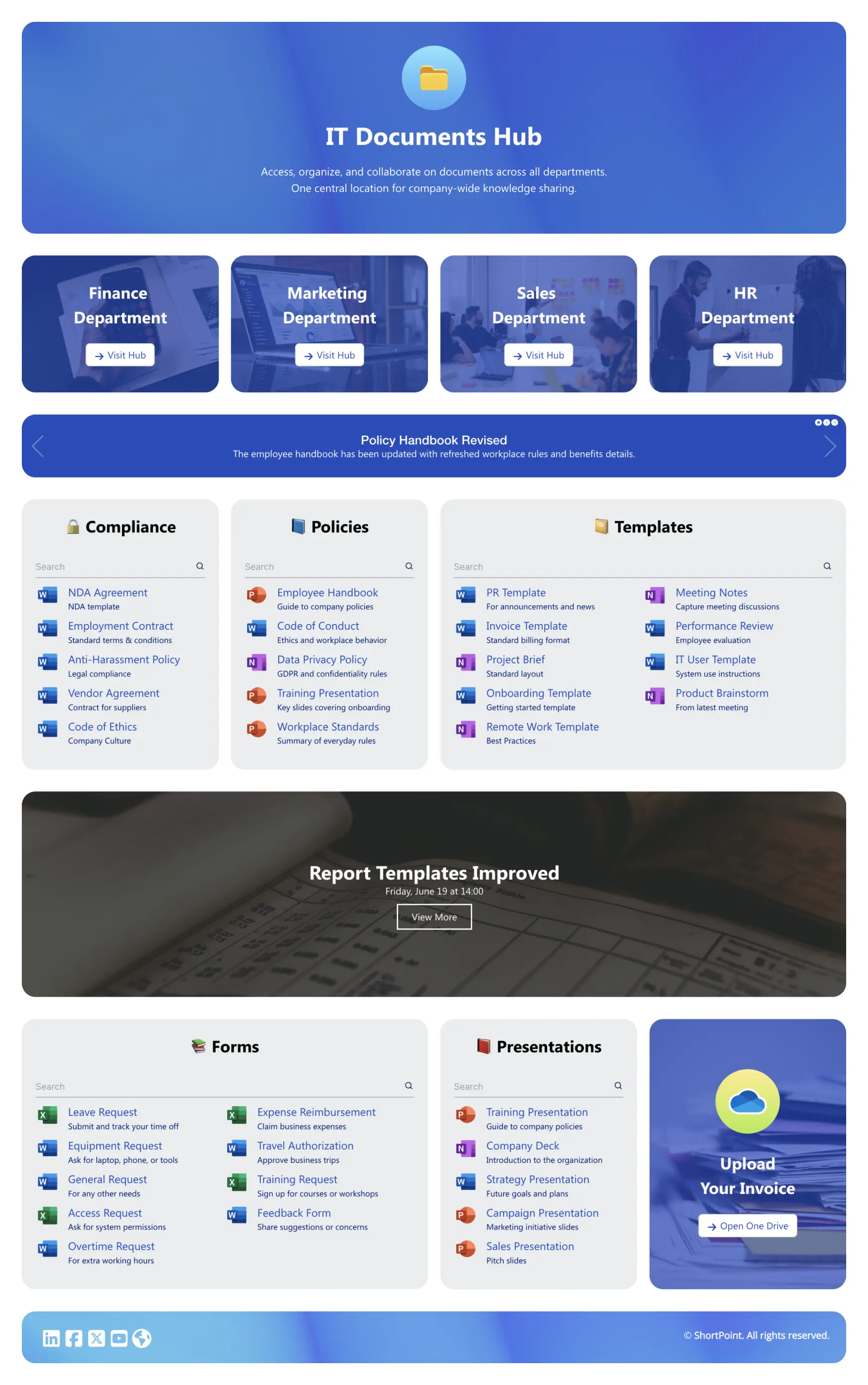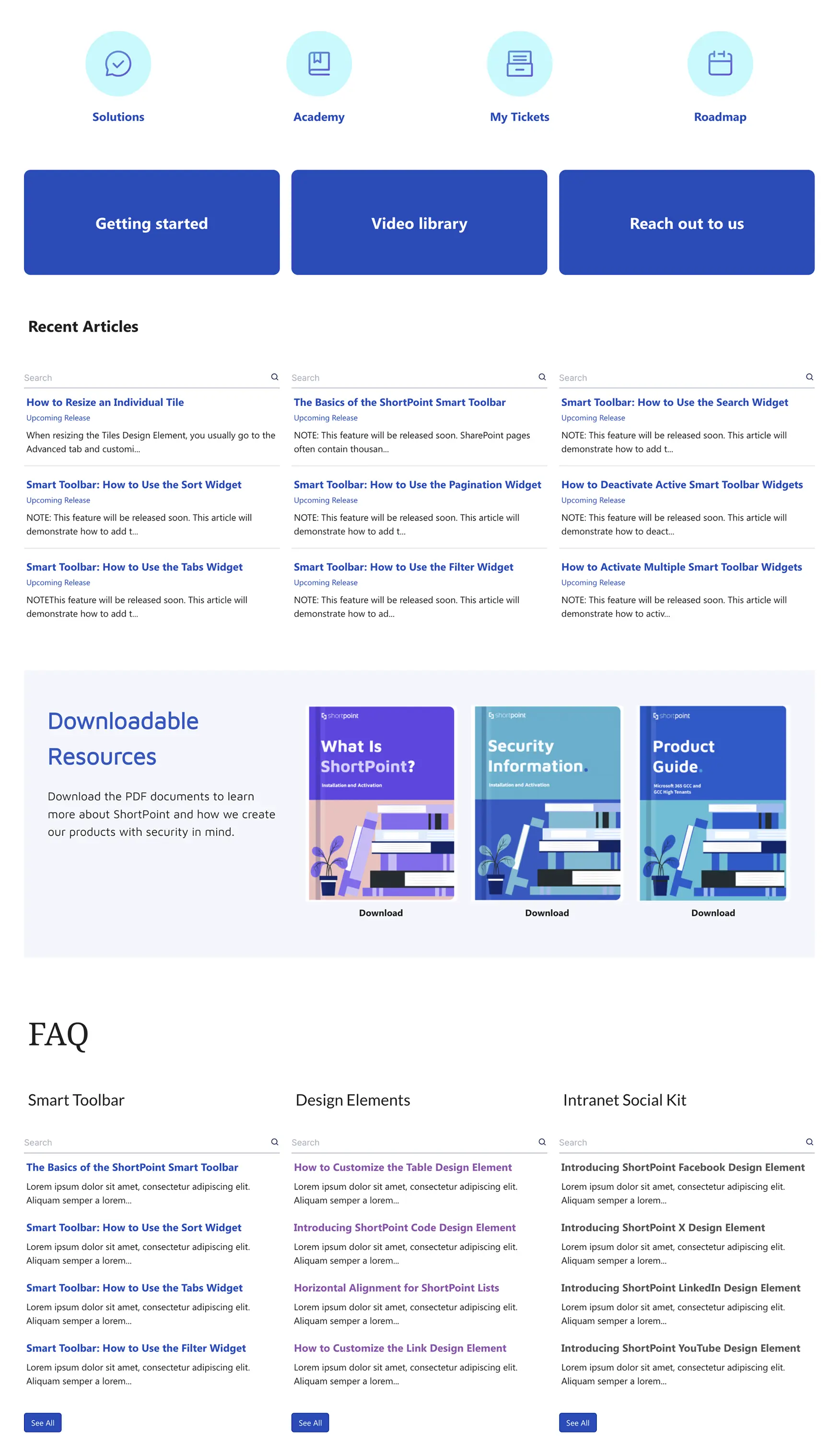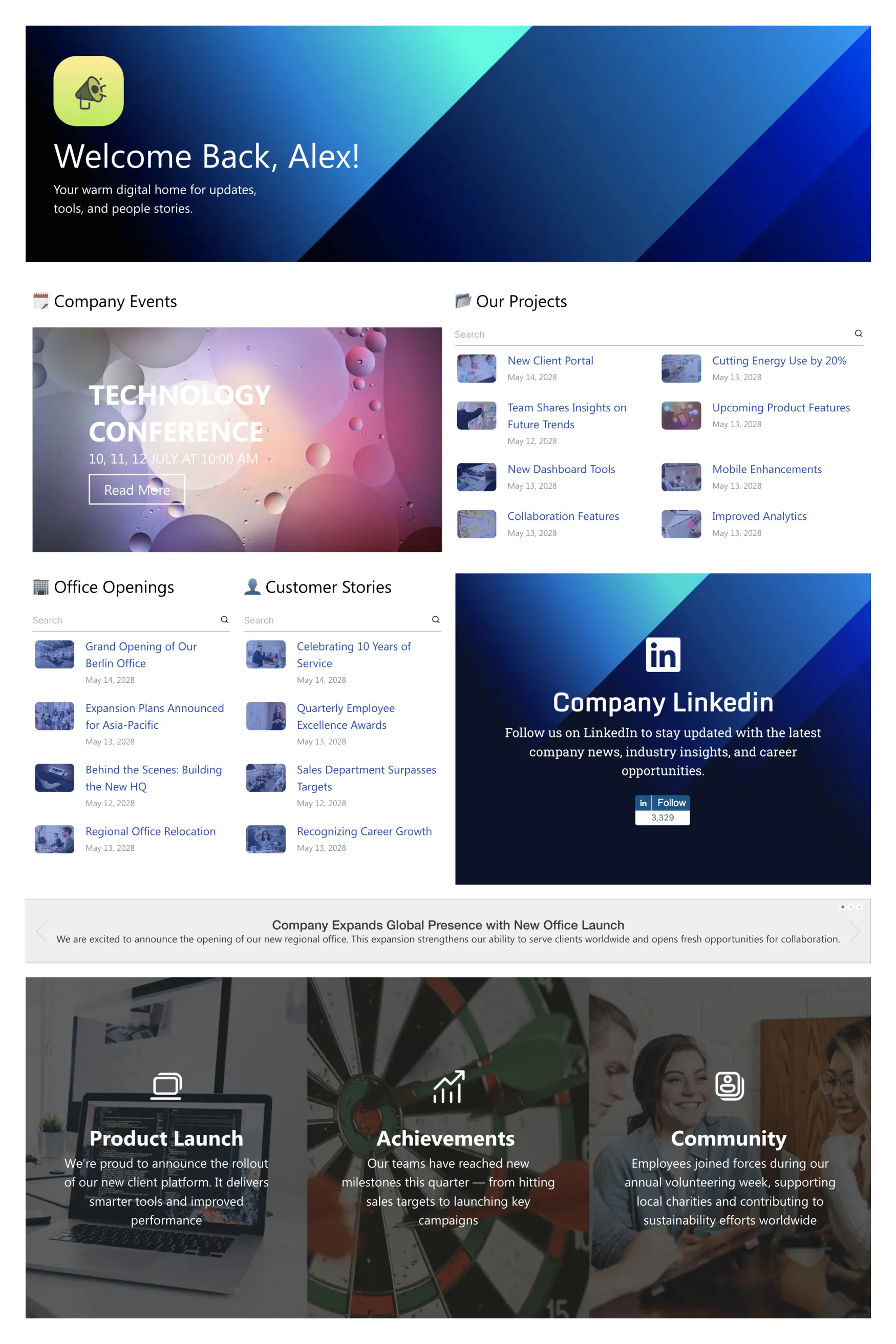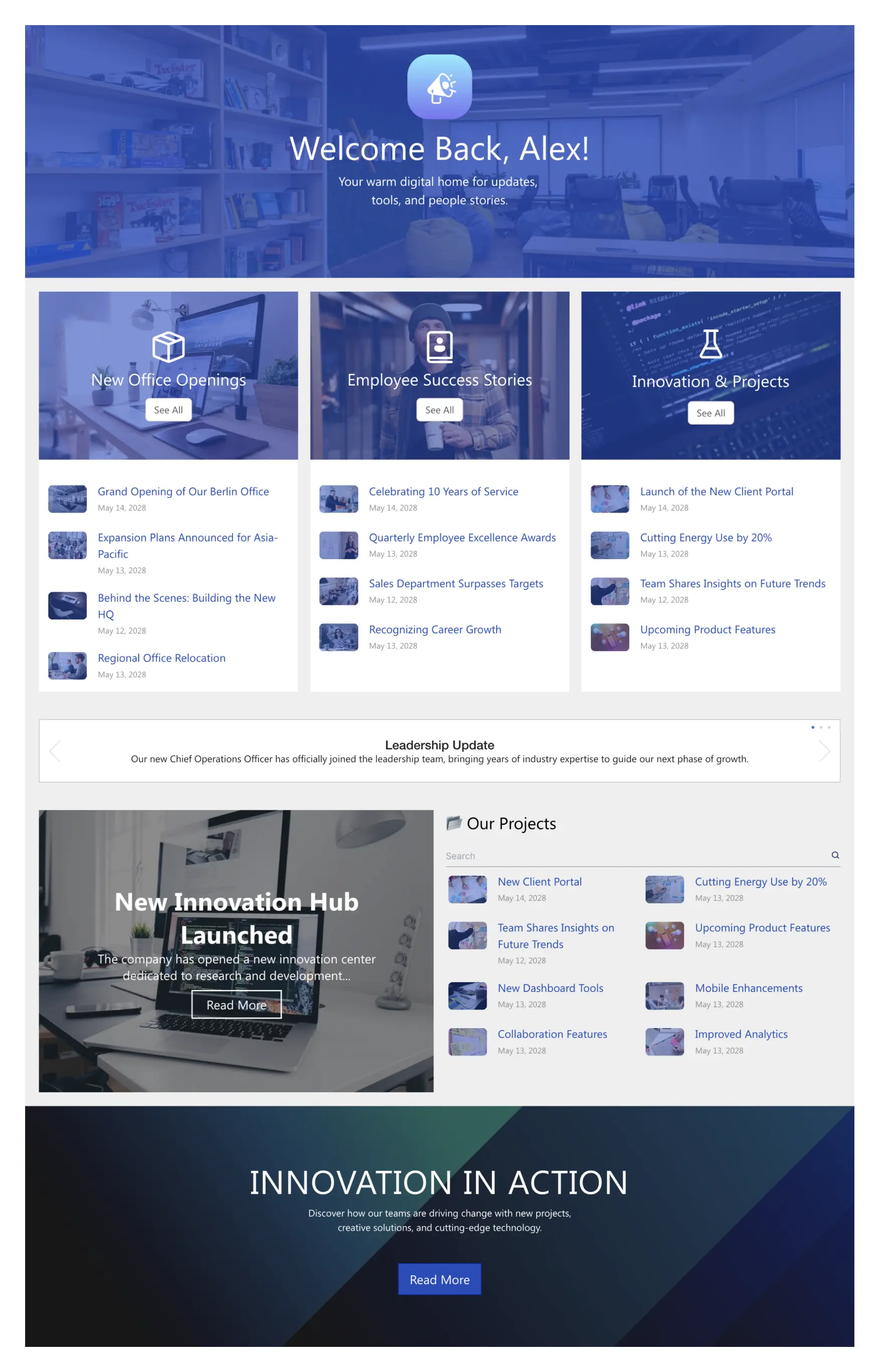SharePoint Intranet Examples: 12+ Templates That Drive Adoption
Note: These SharePoint intranet examples are template-based designs from the ShortPoint library—ready to copy and customize. Designed for teams who want to improve engagement, reduce tickets, and launch fast.
Expert-curated SharePoint intranet designs proven to boost employee engagement. Compare template-based intranet examples from our template library, learn the design patterns used by Fortune 500 companies, and see how you can start a trial to build a modern digital workplace.

ShortPoint
12+
Curated Examples
12M+
Global Users
98%
Customer Satisfaction
Free Trial
No Credit Card
Key Takeaways
- Explore 12+ Proven Templates: This guide covers a range of designs including homepages, knowledge bases, HR portals, and dedicated team sites.
- Start with Templates for Speed: Organizations that begin with a pre-built template typically launch their intranet in weeks—not months.
- Use a Focused Content Architecture: A successful intranet makes 5-7 primary employee tasks accessible within 2-3 clicks from the homepage.
- Personalize Content to Drive Adoption: Deliver the right content to the right people to build habit and stickiness.
If you're designing a SharePoint intranet, you need to see what actually works. These are our 12 top-rated, template-based examples, each designed to drive adoption, reduce support tickets, and make employees' work lives easier.
⚡
Built for 2025 and beyond
This guide now includes mobile-first designs, Graph API integrations, and advanced web parts – reflecting the latest Microsoft 365 capabilities and employee experience trends.
Jump to a Template
SharePoint intranet homepage examples (template gallery)
The company homepage is your digital front door. These modern SharePoint design examples for your intranet homepage show how to maximize engagement. According to Nielsen Norman Group, effective homepage design can increase intranet adoption by 67%.
Homepage
Intranet Homepage
Why This Works: This template sets a clear daily start for everyone. Three essentials sit up front: department updates, company news, and core apps, with people cards for go-to contacts. “Top Resources” keeps the most-used links one click away, and an events panel shows what’s next.
Homepage
SharePoint Homepage Design
Why This Works: A company hub that welcomes everyone with a personalized hero and a powerful search box. Quick icons jump to resources like the handbook and ticketing, while topic buttons keep news relevant. New joiner profiles add context, and a feedback banner closes the loop for continuous improvement.
SharePoint Homepage Intranet Examples & Resources
For more on SharePoint homepages best practices and communication site examples:
HR SharePoint intranet examples (template gallery)
Departmental sites are the backbone of a useful Microsoft 365 intranet. These templates centralize information and empower employees to self-serve, reducing the burden on HR and IT.
HR, Onboarding & Teams
HR Intranet Portal
Why This Works: This portal centralizes search, announcements, offices, and events. A prominent search bar, panels for office locations, and an announcements carousel surface key information. Three content streams organize updates for HR News, Strategy, and Learning. This layout reduces support requests and creates a reliable, self-service destination.
HR, Onboarding & Teams
HR Homepage Template
Why This Works: This HR page sports a top header with universal search and quick links helps staff find answers fast. The main body is a document center with categorized tabs for Policies, Forms, and Benefits. Dynamic widgets show new joiners and company news to build community, and a ‘Getting Started’ section provides quick actions for common tasks.
HR & Teams
SharePoint Onboarding Template
Why This Works: This personalized welcome hub gives new hires one place to find all official content. It features a "Let’s Get You Started" checklist, quick links to Outlook and Teams, and direct access to the Employee Handbook. Sections for tutorials, events, and key contacts ensure new employees have everything they need to succeed from day one.
HR & Teams
HR Intranet Page
Why This Works: This hub is designed for employee services and support. Top-level navigation points to Pay & Benefits, while modules organize Policies, Benefits, and HR Forms. An FAQ section, events calendar, and a "meet the team" layout enhance the employee experience and free up HR professionals to focus on strategic initiatives.
SharePoint HR Intranet Examples
For more on SharePoint HR best practices and examples:
SharePoint knowledge base & document hub examples (templates)
Employees can spend hours each day searching for information. These templates can reduce that search time significantly.
Knowledge Management
SharePoint document library template
Why This Works: This SharePoint document library centralizes forms, policies, templates, and compliance documents into clear categories. A hero section with department shortcuts speeds navigation, while integrated search helps find items fast. An FAQ section provides self-service answers to common questions, reducing support tickets.
Document Hub
SharePoint document management template
Why This Works: A focused hub for day-to-day document work with department tiles to route people fast. Three priority blocks—Compliance, Policies, Templates—include search capability to find files quickly. An “Upload Your Invoice” panel opens OneDrive to collect files without email back-and-forth, reducing chase work.
Knowledge Base
SharePoint Knowledge Base Template
Why This Works: This template centralizes documents, FAQs, and help resources into a streamlined hub. Its architecture adapts to any department through customizable visuals and structured sections, eliminating scattered information that slows teams down. Built for modern workplaces, it delivers a consistent experience across all devices.
Microsoft Graph API Connection [New]
For more on SharePoint HR best practices and examples:
Learn how to effectively use the ShortPoint Microsoft Graph API connection for SharePoint with practical tips and examples.
SharePoint news portal examples (templates)
A great news portal reduces inbox noise and keeps everyone aligned on what matters. These templates turn your intranet into a must-read daily destination.
News & Announcements
Intranet Company News Template
Why This Works: A modern news portal that showcases a friendly hero banner and bold Events slideshow promote what’s next. Sections for Office Openings and Customer Stories highlight growth and wins. A slim ticker flags major news, while dedicated blocks for Product Launch and Achievements turn milestones into clear stories.
News & Announcements
SharePoint Company Feed
Why This Works: This news hub welcomes people with three content streams to surface what matters now—office openings, employee wins, and innovation projects. A leadership ticker flags time-sensitive notes, and a feature banner announces major launches. The clean, skimmable layout makes the latest news easy to find.
The ShortPoint Toolkit: How These Designs Are Built
Now that you've seen what's possible, you might be wondering how to achieve this level of design. The answer is the ShortPoint Toolkit—a suite built to help you build a polished, branded, and functional intranet without writing a single line of code.
Page Builder. Design Without Code.
Create stunning SharePoint pages effortlessly with the intuitive drag-and-drop Page Builder. Arrange layouts, add web parts, and bring your design ideas to life.
Theme Builder. Consistent Branding.
Maintain a strong, unified brand identity. Apply your company’s colors, fonts, and styles across your entire site instantly.
Graph Connect. Live M365 data.
Keep your intranet dynamic with real-time connections to SharePoint Lists and the Microsoft Graph API. Display live information from a single source of truth.
Design Kit. Pre-Built Layouts.
Accelerate your intranet build with hundreds of ready-made patterns and pre-designed sections. Simply copy, paste, and customize.
Responsive & Accessible Design.
Every element is fully responsive and accessible, delivering a seamless experience across all devices and ensuring inclusivity for every employee.
Deep Microsoft Integration.
From calendars to Microsoft Graph API connections, ShortPoint integrates smoothly across the Microsoft ecosystem, creating a powerful, data-driven hub.
How to Apply These Ideas: Your 3-Step Plan
Feeling inspired? You don't need to be a developer to build a world-class intranet. Here's the proven 3-step process used by 500+ organizations to launch in 2-3 weeks instead of 6+ months.
1. Start with a Proven Template
Build with confidence. Our templates are designed by experts and based on industry-leading best practices. Select a template to get a head start with a validated architecture, mobile-ready layouts, and built-in accessibility compliance. Ready to explore? You can start a free trial any time.
💡 Time Savings: Customers report launching up to 60% faster (2-4 weeks vs. 6+ months for custom builds).
2. Apply Your Brand Identity
Make it yours with colors, logos, and fonts in minutes. Use the theme builder to instantly apply your brand guidelines across all pages, ensuring the intranet feels like an integrated part of your organization.
🎨 Design Tip: Consistent branding increases employee trust and makes the intranet feel "official" rather than a side project.
3. Connect Content & Launch
Link template components to your existing SharePoint lists and Microsoft 365 services for dynamic, real-time content. Before launch, run user acceptance testing with 5-10 employees to refine navigation and ensure relevance.
🚀 Launch Strategy: Launch iteratively. Companies that start with a homepage + 1-2 portals see up to 82% higher adoption than those trying to build everything at once.
⏱️ Timeline: Template-Based vs. Custom Build
Template-Based Approach (Recommended)
- Week 1: Template selection & branding
- Week 1: Content connection & testing
- Week 2: User testing & refinements
- Week 3: Launch! 🚀
Total: 2-3 weeks
Custom Build Approach
- Months 1-2: Requirements & wireframes
- Months 3-4: Design mockups & revisions
- Months 5-6: Development & testing
- Month 7+: Launch (maybe)
Total: 6+ months
Result: Template-based launches are significantly faster and more cost-effective.
Deeper Dive: Advanced & Implementation FAQs
SharePoint Intranet Design & Branding
My SharePoint site looks generic. How can I apply my company's branding without complex coding?
This is a common issue, as native SharePoint branding can be restrictive. The most effective solution is to use a no-code design tool with a Theme Builder. This allows you to apply your exact brand colors, upload custom corporate fonts, and design unique headers and footers—all through a visual interface, with no risk of breaking your site when Microsoft releases updates.
We don't have a web designer. How can we create professional-looking intranet pages?
We're stuck with SharePoint's rigid page layouts. How can we create more dynamic designs with tabs or accordions?
You can overcome SharePoint's native layout limitations by using a no-code page builder. These tools provide a library of 70+ versatile design elements like Tabs, Accordions, Image Carousels, and more. You can simply drag and drop these elements to create any custom layout you need, which is impossible with the handful of predefined layouts offered by default SharePoint.
Technical & Ease of Use
Do I need to be a developer to design a custom SharePoint site?
Not anymore. Modern no-code platforms like ShortPoint are specifically designed to empower business users in departments like HR, Marketing, or Communications to become SharePoint designers. The entire experience is built around intuitive drag-and-drop interfaces, so you can create and manage beautiful sites without writing a single line of code.
Will my custom SharePoint designs break when Microsoft releases updates?
How much faster can we launch an intranet using templates and a page builder?
The time savings are one of the most significant benefits. By using a template-based, no-code approach, organizations can reduce intranet project timelines from months to just a few weeks. Case studies show intranet builds being completed 4x faster, with some projects finishing in 2 weeks instead of an estimated 3 months.
Content, Data & Integration
How can I keep my intranet content from becoming outdated?
The key is to use dynamic content connections. Instead of manually updating pages, you can use features like ShortPoint Connect to link page elements directly to a SharePoint list, library, or other data source. When you update the information in the source list, the content on your page refreshes automatically, ensuring your intranet remains a reliable source of truth.
Can I display data from other systems like Power BI or social media?
Will adding more design elements slow down my SharePoint pages?
Not if you use an optimized tool. While large images and custom code can slow down native SharePoint sites, platforms like ShortPoint are engineered for performance. They include features like lazy loading for long pages and data caching to ensure that even visually rich, dynamic pages load quickly for a better user experience.
Value & Implementation
Is it worth paying for a design tool when SharePoint is "free"?
While SharePoint is part of your M365 subscription, achieving a truly branded and user-friendly intranet often requires significant hidden costs like developers or ongoing maintenance. A design tool provides a clear return on investment (ROI) by eliminating these costs, accelerating launch times, and empowering your existing team to manage the site without needing technical expertise.
What is the licensing model? Do we need a license for every employee?
What kind of support is available if our team needs help?
Leading third-party solutions provide robust customer support. ShortPoint is frequently praised in user reviews for its excellent support, which includes live assistance via phone, email, and chat, as well as a comprehensive knowledge base or the ShortPoint Academy.
Ready to Build a Better Intranet?
Stop building from scratch. See how ShortPoint can help you launch a beautiful, functional SharePoint intranet in weeks, not months. No code required.
Frequently Asked Questions
How do you make a SharePoint site look good?
To make a SharePoint site look good, you should move beyond the default templates. Use a tool like ShortPoint's Page Builder to create custom layouts with multiple columns, apply your exact corporate branding (colors and fonts) with a Theme Builder, and use high-quality, professional imagery. The key is to create a focused, uncluttered user experience that prioritizes your employees' most common tasks.
What are the key features of a good intranet homepage?
Can you make SharePoint not look like SharePoint?
Yes, absolutely. You can make SharePoint not look like SharePoint by using third-party design tools that override the default branding and layout limitations. By implementing a custom theme, header, footer, and using dynamic design elements like carousels and accordions, you can transform a standard SharePoint site into a fully branded, modern digital workplace that is indistinguishable from a custom-built website.
How do you increase user adoption of a SharePoint intranet?
To increase user adoption, the intranet must be genuinely useful. This means ensuring content is relevant and up-to-date, making critical tools and information easy to find (within 2-3 clicks), and providing a great user experience on both desktop and mobile. Personalizing content for different departments or roles can increase engagement by over 40%.
What is the difference between a SharePoint team site and a communication site?
A Team Site is for collaboration within a group; it's where a team works on files, manages tasks, and has private conversations. A Communication Site is for broadcasting information out to a broad audience; it's used for company news, HR portals, and homepages where a small number of people create content for many to consume. The examples in this guide primarily focus on communication site designs.
Methodology & Sources
Adoption, engagement, and speed metrics are derived from aggregated, anonymized ShortPoint customer data and case studies: Customer stories. For general intranet UX guidance, see established usability researches.

